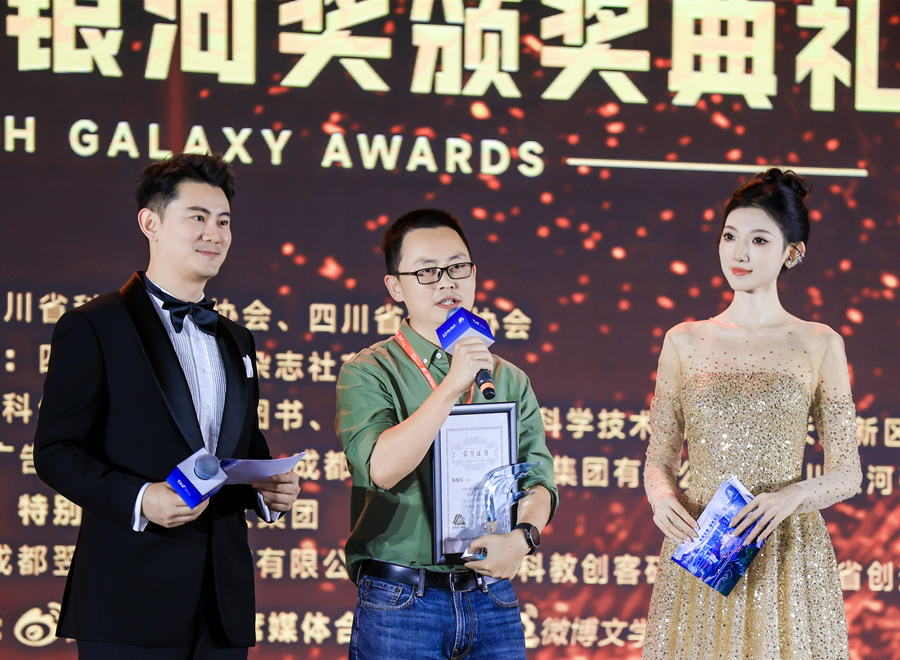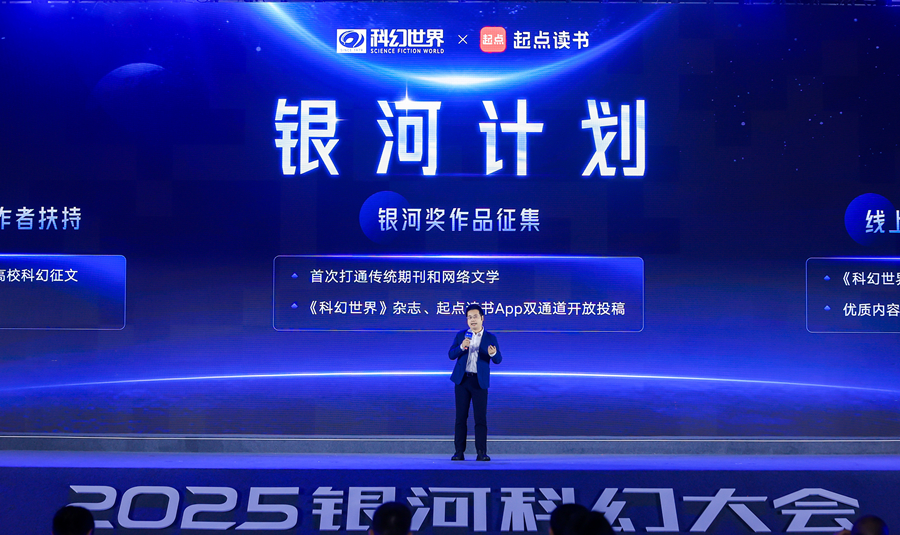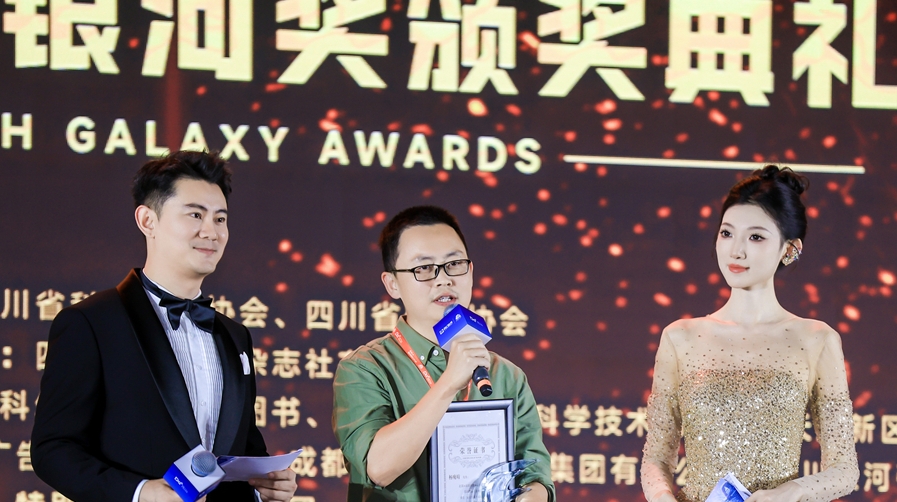The 36th Galaxy Awards ceremony, one of China's most prestigious honors in science fiction literature, took place on the evening of Sept. 19 in Chengdu, Sichuan province, highlighting web literature as a vital new driving force for the sci-fi genre.

Writer Yang Wanqing speaks as he receives the best novel award for his work "Jin Tao" at the 36th Galaxy Awards ceremony held in Chengdu, Sichuan province, Sept. 19, 2025. [Photo courtesy of Science Fiction World]
Writer Yang Wanqing emerged as the star of the evening, earning top honors for best novel and best original book for his work "Jin Tao" (Golden Peaches). He also took home the best short story award for "Lai Ri Fang Chang" (There Will Be Time).
"Jin Tao" is set in the heyday of the Tang dynasty (618-907), creating a world of ancient Chinese technology by replacing modern industrial science with elements like silk, porcelain and arithmetic. The work showcases a distinctly Chinese science fiction sensibility.
The story follows three characters — an ethnic minority girl, a Tang soldier, and a Shadow Kingdom envoy — on a journey east, centered on a coveted super algorithm guarded by the Samarkand Academy. Technological marvels include silk-based "computational fabric" replacing chips, and a "Mirror Tower" which transmits optical signals. The narrative explores clashes and fusion between Chinese and Western civilizations, ancient technological challenges, and the theme that technology is secondary to people and ideas.
The Galaxy Awards, established by Science Fiction World magazine in 1985, marked their 40th anniversary that evening. However, as the awards were not held annually until 1991, only 36 ceremonies have been conducted over the 40-year period. Over time, the award categories have been refined — for instance, a new best novelette category was added to complement the existing awards for novels, novellas and short stories. Additionally, the best academic work award, previously announced, was also presented for the first time at this year's ceremony.

Sci-fi heavyweights and industry insiders share a big cake to celebrate the 40th anniversary of founding Galaxy Awards in Chengdu, Sichuan province, Sept. 19, 2025. [Photo courtesy of Science Fiction World]
The awards also highlighted the growing influence of web literature within the science fiction genre. "Wherefore It Never Ends" shared the best original book award with "Jin Tao." Its author Keyao42 became the first author of female-oriented web fiction to win a Galaxy Award. Meanwhile, Tianrui Shuofu, known for his award-winning novel "Once Upon a Time in Nanjing," received the best sci-fi web writer award. The best sci-fi online literature award was presented to Hu Wei for "Fault Utopia," and the best new writer awards were given to online authors Liu Maijia and Chengchengyuchan (Wei Rongheng).
Chengchengyuchan won the best sci-fi online literature award last year for his work "Genius Club," making this his second consecutive win at the Galaxy Awards.
He stated, "With the development of the times, web literature is gradually gaining more recognition. I hope to see more web works enter the stage of the Galaxy Awards in the future." In his view, the broad reach of web fiction makes it an effective medium for sparking readers' interest in science fiction and expanding sci-fi's influence on readers.
Additionally, the Galaxy Awards introduced a new category for best international sci-fi web literature to recognize works that have played a significant role in promoting Chinese science fiction overseas. The award was given to Heishan Laogui (Shi Ruilei) for his work "Starting from the Red Moon."
It is worth noting that Yuewen, China's leading online literature and entertainment platform, emerged as a major winner at this year's Galaxy Awards. The company received 16 nominations for its writers and works and secured five awards — both record highs for the company. Among the honored authors were the aforementioned writers, including Tianrui Shuofu, Keyao 42, Hu Wei, Heishan Laogui, and Chengchengyuchan. Additionally, four other works from Yuewen were also selected for the most valuable IP list at this year's event.
At the Galaxy Science Fiction Convention held on the same day, Yuewen's Qidian Reading partnered with Science Fiction World to officially launch the "Galaxy Project." Renowned writers A Lai and Liu Cixin serve as special chief advisors for the initiative, which aims to nurture new talent and promote the growth of science fiction.

Yang Chen, vice president and editor-in-chief of Yuewen, introduces "Galaxy Project," during the Galaxy Science Fiction Convention in Chengdu, Sichuan province, Sept. 19, 2025. [Photo courtesy of Science Fiction World]
Yang Chen, vice president and editor-in-chief of Yuewen, outlined the project's three main initiatives. These include supporting young sci-fi creators through a million-yuan writing competition that offers royalties and editorial guidance, opening a joint Galaxy Awards submission channel accessible through Science Fiction World magazine and the Qidian Reading app, and launching a dedicated sci-fi section on Qidian Reading that features classic electronic issues of Science Fiction World.
"Chinese web literature, including science fiction, has captivated readers worldwide with its magnificent imagination, compelling stories, and a strong sense of immersion," Yang said. "Moving forward, Yuewen will continue to develop the industry chain, systematically enhance its global reach, and collaborate with overseas partners to promote the international development of original IPs."
The 2025 Galaxy Science Fiction Convention was held at Chengdu's Science and Innovation Ecological Island from Sept. 19 to 21, featuring a wide range of events. In addition to the Galaxy Awards ceremony, the convention included forums, investment deal signings, exhibitions, film screenings, and book signings. Around 300 guests from ten countries and regions across four continents attended, including sci-fi luminaries such as Liu Cixin, Robert J. Sawyer, and Clarkesworld magazine editor-in-chief Neil Clarke.





 Share:
Share: 






 京公网安备
11010802027341号
京公网安备
11010802027341号